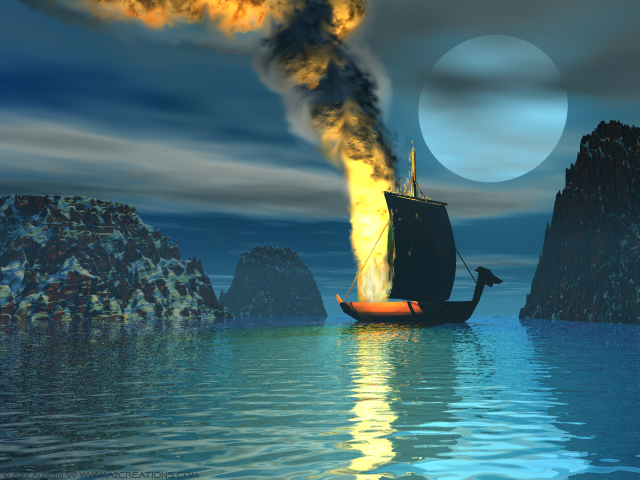Fire and Water, Or At Least Serious Swiggage of Firewater
Thursday, February 5, 2009
posted by Steve Tompkins
 Print This Post
Print This Post

Right about now there are seemingly two kinds of people, those who are already missing TC-as-a-print journal, and those who aren’t in a position to miss it, because for reasons best known to themselves they’ve been missing out ever since the spring of 2004. The good news is, it is still possible to remedy the latter delinquency, to escape the darkling plain where certain ignorant armies persist in clashing by night, by pouncing in a swell foop on the back issues Leo will be selling for a little while longer. The alternative is, I suppose, to repair to a repurposed fallout shelter and read the exciting Princess-Sumia-gets-abducted-yet-again scenes in old Lin Carter paperbacks to one’s action figures.
As a student of the American classics, Leo must be feeling a little like Tom Sawyer at the moment, kibitzing at his own funeral. He gave TC a Viking-by-way-of-the-coast-south-of-Kush sendoff with “A Cimmerian Coda” at the end of V5n6, and the motif is reinforced by the seagoing synchronicity of Donald Sidney-Fryer’s “A Ship Sails Out to Sea”:
The moon came up just as the sun went down,
Leaving behind a blaze, a fiery crown,
A coronal of purple, gold, and flame:
Inside this blaze the ship appeared to drown
Better a coronal than a coronary, nicht wahr? And how perfect that The Last of the Courtly Poets should be The Last Cimmerian Poet as well.
Over at the REHupa blog, itself another non-Ozymandian monument to Leo’s titanic task-orientedness, Rusty pays tribute in “Farewell, Cimmerian.” The journal began its call-’em-as-it-saw-’em life by raining, even hail-storming, on what was then the Wandering Star parade, but in subsequent years Burke-midwifed Del Rey trade paperbacks and TC issues almost seemed to be taking turns in a coordinated release schedule like that of new Beatles and Stones singles back in the Sixties. Something tells me the most recent period of Robert E. Howard’s afterlife is going to be quite easy to romanticize.
Rusty reminds us that this is an occasion for an elegy, not a eulogy, but I can’t keep from recycling a passage that, ever since The Road of Kings came out in 1979, I’ve associated with Leigh Brackett, Karl Edward Wagner, and losses the aches of which never abate:
And the song of Shannach ebbed into silence, as the last of the children of mountains went forever into night.
Below: During the glory days of 2006, Leo encourages a young Howard fan to submit something to TC

